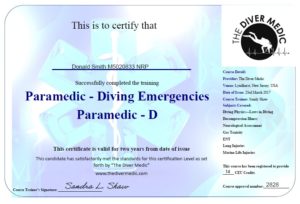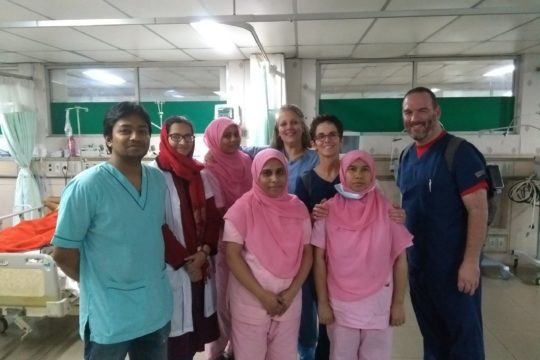Last week I had the pleasure of attending an EMT-Diver course sponsored by The Diver Medic, an organization created by Chantelle Newman. Working in the Caribbean on a dive destination island, we see our share of dive related calls and any opportunity to learn and improve I jump at. The fact that this was in NJ, in March where the temperature reached 24F wasn’t on my mind when I signed up. This was the second time this course was offered and was taught by Sandy Shaw, a local EMT and dive instructor. The first course was offered as a pre-course to DEMA, the professional dive show held annually either in Las Vegas or Orlando. This time, the course was scheduled just before Beneath the Sea (BTS), the annual dive show held in Secaucus, NJ.It was 2 days long and covered everything from some dive physics and pathophysiology to marine animal stings, bites and envenomation. Sandy is a fun instructor who was able to keep the course moving well. Hosted by the Lyndhurst Fire Department, one of the course highlights was meeting with their public safety dive team and reviewing their gear and training. We also enjoyed lunch at Michael’s Salumeria, if you’re in Lyndhurst, you need to stop here. Just make sure if you order a sandwich with prosciutto, you pronounce it correctly.
Overall it was a good course, especially as an introductory level course for EMR’s or EMT’s. If you’re coming from it with little experience and may find yourself working a dive emergency, the information will prove valuable. As a medic with a fair amount of dive medicine experience it was a good review, but I would recommend ALS providers with dive training at the PADI Rescue level or higher pursue their DMT course offering.
Following the conclusion of the course I had a day off then attended Beneath the Sea (BTS) for the day. This was my third time to BTS and it is a great opportunity to connect with experts in a variety of diving fields. It’s nice if I attend with my wife because I hit all the medical related seminars and she hits all the photography ones. There’s enough variety for both of us (although this time I was flying solo). One dive medicine presenter I usually always see speak is David Charash, MD. Dr. Charash is an ER doc and dive medicine physician who for several years organized a dive medicine conference in Danbury, CT. This time he was offering a course on otic barotrauma, a popular course that sells out every time it’s offered. The year before I was late signing up and couldn’t get in. This year I made sure to be there. It’s a great hands-on course to learn about barotrauma that can occur in diver’s ears. Although it’s an incredibly common dive injury, it can be an overlooked topic. I mean, when I think of barotrauma I think of chest injuries, lungs specifically. But, significant injury can occur to your ears when diving and can result in permanent injury that may end a career in diving. In addition to the obvious, ascending slowly, not diving when you have a sinus infection, avoiding decongestants and proper ear hygiene will go a long way to keeping your ears healthy.
I finished out the weekend by catching up with my family who live just down the street. All in all a great time.



